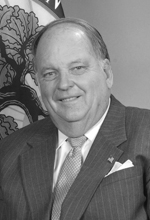
John H. HagerAssistant Secretary, Special Education and Rehabilitative Services For his outstanding contributions as an industry, government, and community leader Making a Grand Slam With a Curve BallJohn Hager was 34 and life was flowing smoothly. He had just been given the biggest promotion of his career, he and his wife, Margaret, had recently welcomed their first child, and he was on his way to the top of the corporate world. That was one day in August 1973; the next day, his life changed forever. Polio, which had disabled thousands of Americans in the 1950s, had been nearly eradicated by the Salk vaccine. But when his infant son was inoculated against polio with the live-virus Sabin vaccine in August 1973, Hager contracted the disease from the vaccine and nearly died. After four months of hospitalization and rehabilitation, he emerged–without the use of his legs–to a new life. “I had gone to the top and got knocked down to the bottom,” Hager says. He had lost his promotion with American Tobacco Company but rejoined the company and worked his way back to the top, demonstrating the spirit and diligence that has propelled him since. He retired as American Tobacco Company’s senior vice president, Leaf and Specialty Products Division, when the company was sold to British American Tobacco Company. Driven by Boundless EnergyHager grew up in Durham, North Carolina, the son of two Purdue graduates. His father, Virgil, received a bachelor’s degree in chemical engineering in 1928 and went on to become executive vice president for the American Tobacco Company; his mother, Ruth, graduated in home economics in 1928. In 1965, the couple established a scholarship in their name that supports students in the College of Consumer and Family Sciences and the School of Chemical Engineering. Logical by nature and determined to climb to the top of corporate America, the younger Hager decided to study engineering and then business. Not one to do things halfheartedly, he took 25 credit hours in one semester (double the standard load), ran a vending machine business on the side, and enjoyed his time with Sigma Alpha Epsilon fraternity. When he emerged with a bachelor’s degree in 1958, he headed straight to Harvard Business School for an MBA. “A young person needs to know what their passion is and what their goals are, and that, in large measure, dictates your preparation and direction,” he says. American Tobacco Company, a large and diversified company, offered him the best opportunity to follow his chosen direction. “I felt I could move faster there, so I started out in the management training program,” he says. Promotions over the years took him from Richmond, Virginia, to North Carolina, back to Virginia, then north to New York, and back to Richmond, where polio caught up with him. While it knocked Hager flat, it by no means knocked him out. As Hager strengthened, he returned to work but also pursued new directions through volunteer work in civic, charity, and political organizations. He once said that since he could no longer golf, he decided to occupy himself by volunteering–a lot. Over the years, Hager has served more than 35 organizations, ranging from the American Red Cross to the Southern Growth Policies Board and from the Virginia Performing Arts Foundation to the board of Richmond’s Children’s Hospital. Leading Virginia, Leading the Nation’s EducationThe political volunteer work was especially appealing to Hager, who worked for Virginia Lieutenant Governor John N. Dalton in 1975, was a delegate to the Republican National Convention in 1984, and co-chaired Oliver North’s senatorial campaign in 1994. He was then ready to go at it full time and, in 1997, was elected lieutenant governor of Virginia on a Republican ticket with James S. Gilmore. His work included promoting anti-crime initiatives, directing state lottery profits for use in education, and improving transportation. When Hager lost the nomination for governor in mid-2001, he prepared for a move to Washington to work for President George W. Bush. The attacks of September 11, 2001, however, altered those plans. Hager was asked to oversee Virginia’s homeland security, a job that he continued when newly elected governor Mark R. Warner invited Hager to join his cabinet in 2002 as homeland security director. Under his guidance, Virginia’s preparedness and homeland security became a model for other states, and in collaboration with his counterparts in Maryland and Washington D.C., Hager created a regional security structure that leads the nation in preparedness. In 2004 Hager joined the federal Department of Education as assistant secretary of the Office of Special Education and Rehabilitative Services. In this role, he oversees some 280 employees and a $14.5 billion budget. He is charged with helping carry out President Bush’s New Freedom Initiative to provide independence and opportunity for individuals in the special- education and vocational-rehabilitation system. The position is a great fit for a man who has refused to acknowledge disability as a barrier and has steadfastly and optimistically pursued success. “My greatest satisfaction is helping individuals at the grassroots level,” he says. “We impact 7 million special-education students, a population that needs opportunity and improved outcomes. Research is supporting efforts to allow people to live independent lives and to live as I have, which is to not be disabled,” Hager and his wife have two grown sons. He spends much of the week traveling, commutes home to Richmond from the nation’s capital every weekend, and likes to get exercise swimming when he can. When asked about his future in politics, Hager laughs and says, “Oh, I don’t know…. I’m free and flexible. I’m a Type A personality who likes to get things done, likes to be involved, and likes to make the most of it.”
MBA ’60, Harvard University |
DEAs : Our People - Mechanical Engineering - Purdue University
Skip to main content
Search
Loading
